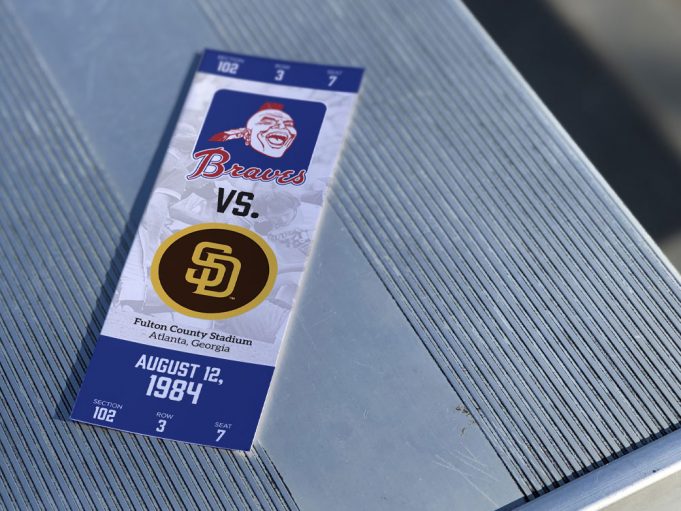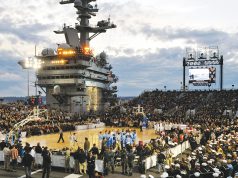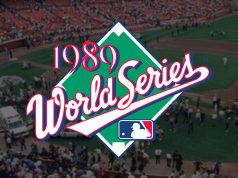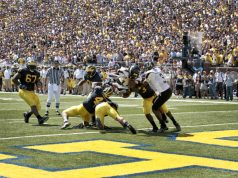It may happen that an umpire can go through an entire career without a “hat trick.” That’s baseball parlance for ejecting three participants in a single game. Imagine what it would be like to eject 17 players, coaches and managers in a single game!
Say hello to Steve Rippley, who had the unfortunate experience of doing just that during an Aug. 12, 1984, game between the San Diego Padres and the Atlanta Braves.
Rippley, who would go on to a 21-year, three-World- Series career as an NL umpire, was in his second season. On the crew were crew chief John McSherry at first base, Fred Brocklander at second and Charlie Williams at third. Sadly, all three of Rippley’s crewmates are now deceased.
Thanks to a couple of rain delays, that game started about two hours late. The first batter of the game, San Diego’s Alan Wiggins, stepped in and was hit in the ribs with the first pitch from Pascual Perez. The normal thought here would be, “Hmm, interesting way to start a game.” Boy, was it!
“I knew right away what was happening,” Rippley said. “The night before, Wiggins bunted a couple of times to get on base.” That played as well with the Braves as someone cutting in line at a soup kitchen. Wiggins’ biggest tormentor was Perez, who had observed the previous day’s game from the end of the dugout. “Perez and Wiggins had words,” Rippley recalled, “so the next day when Wiggins was hit with the first pitch of the game, I knew exactly what was going on.”
Padres Manager Dick Williams also knew exactly what was going on. He made it very clear that the Padres would be looking forward to Perez’s first plate appearance. Because of the rules of the day, Rippley could do no more than give San Diego its due. Unfortunately, for Rippley and the game itself, the Padres failed miserably. “They couldn’t hit him in three shots,” Rippley remembered. Players from both teams came to the front of their dugouts, so Rippley warned both benches.
In the fourth inning, Perez was up again. This time Ed Whitson attempted to hit him. But Perez was ready and backed away, and Whitson and Williams were gone. Before he left, Williams told Rippley, “We are not going to be the only ones you are going to run today.”
That comment may have prompted the league to fine Williams $10,000 and suspend him 10 days.
The game moved to the sixth inning, and relief pitcher Greg Booker took his turn trying to hit Perez. Like the other Padres pitchers, he couldn’t find the mark. By then, the Braves had had enough and it was on. Booker and acting manager Ozzie Virgil joined the growing list of ejectees.
In the eighth inning, with tempers near the breaking point, it was up to the Padres fourth pitcher of the game, Craig Lefferts, to deliver longawaited justice. By then, the very alert Perez was ready for anything. He backed out as Lefferts went into his windup. Lefferts came through with a fastball and nailed Perez in the elbow and it was on again.
This time the party was joined by a new participant, Braves third baseman Bob Horner. Horner’s route to the field was a little unusual. “He was on the disabled list and was watching from the press box,” Rippley remembered. Horner had the presence of mind to drop by the Braves clubhouse and get out of his street clothes and into uniform. When Horner got to the field, things had pretty much calmed down so Horner was watching the activity in front of the Braves dugout. Enter Champ Summers, who raced across the field to try to get to Perez, who was standing on the steps of the Braves’ dugout. Horner was standing in the way so Summers gave Horner a push. A fan then tossed what appeared to be a cup of beer at the two and the brawl was reignited.
The severity of all this activity was evidenced by McSherry being knocked to the ground twice in his attempt to get things under control.
Things did calm down. For a short while.
“SO THE NEXT DAY WHEN WIGGINS WAS HIT WITH THE FIRST
PITCH OF THE GAME, I KNEW EXACTLY WHAT WAS GOING ON.”
New Braves pitcher Donnie Moore wasted little time in hitting leadoff hitter Graig Nettles, and for the third time in the game, both benches emptied. After it appeared order was restored, Padres pitcher Goose Gossage went after Moore, setting off more pushing, shoving and fisticuffs.
McSherry then ordered both benches cleared, sending the remaining players to their clubhouses. It was reported on the website Retrosheet.org that McSherry thought about forfeiting the game but decided not to do so since the Braves had started the last brawl and McSherry did not want to give the game to the Padres, who were the instigators of the series of events.
Rippley was scheduled to join Bob Engle’s crew the next day in Houston.
“Ejection reports had to be written before midnight, so I wrote my report on my flight to Houston,” Rippley said. “I was sitting between two nuns so I had to be careful what I wrote. We had no computers those days, but I did write most of the information before midnight.”
When asked his thoughts on what has often been described as one of the most talked about brawls in MLB history, Rippley paused, smiled for a moment and said, “You know, you can blame this on Ed Whitson for not doing his job.”
Despite the long delays, the game, played at Atlanta Fulton County Stadium in the summer heat and humidity, lasted two hours, 56 minutes, about 25 minutes longer than the average game time in 1984. In what would turn out to be an afterthought, the Braves won, 5-3.
San Diego returned to Atlanta for the final three games of the regular season. The NL, wanting to avoid a repeat of the series in August, assigned a “take no prisoners” crew of Doug Harvey, Joe West, Frank Pulli and Jerry Crawford. As one might imagine, there were no incidents the entire series.
The Padres went on to win 92 games and capture the NL West championship by 12 games over Atlanta and Houston. The Padres’ success did not end there. After losing the first two games of the NLCS to the Cubs, San Diego won three straight to make its first appearance in the World Series. The Padres lost to Detroit in five games.
So, 35 years ago this August, the Padres and Braves went at it in one of the most notable brawls in baseball history. A Braves fan summed it up about as well as anyone. “It was just awesome!”
Ken Allan, Diamond Bar, Calif., a retired 30-year D-I umpire, is the California state rules interpreter for high school baseball.
What's Your Call? Leave a Comment:
Note: This article is archival in nature. Rules, interpretations, mechanics, philosophies and other information may or may not be correct for the current year.
This article is the copyright of ©Referee Enterprises, Inc., and may not be republished in whole or in part online, in print or in any capacity without expressed written permission from Referee. The article is made available for educational use by individuals.



















